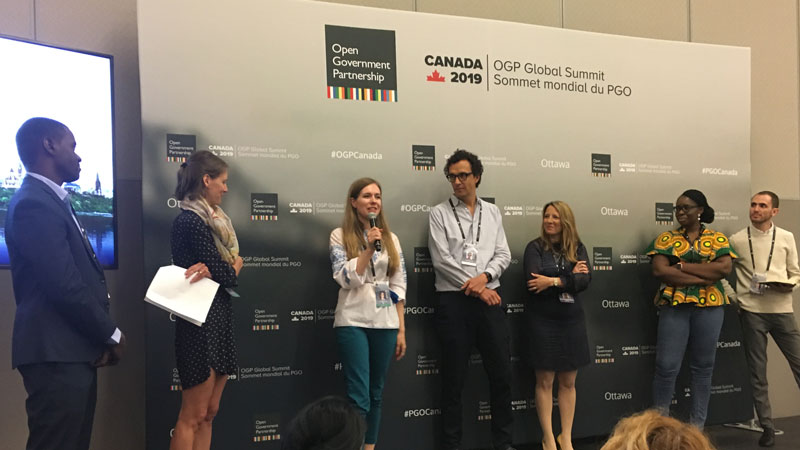
Article
June 4, 2019
OGP Summit 2019: Improving health outcomes through Open Contracting – 3 key takeaways from Ottawa


Sebastiana Etzo, Eliza Hovey and Tom Wright
It has been a busy and exciting week for the TI Health Initiative’s Open Contracting for Health (OC4H) team in Ottawa, where we participated in the Open Government Partnership Summit.
Open contracting and procurement featured prominently in the 2019 agenda – the result of years of evidence-generation in the field, leadership by the Open Contracting Partnership (OCP) and a renewed push from within OGP. Unsurprisingly, health is also a key focus for OGP member countries. The link between improved health outcomes and stronger, more transparent procurement systems is evident – according to the World Health Organisation (WHO), of the 10 leading causes of health spending inefficiency, five are procurement-related.[1] This growing recognition is transforming the types of commitments we see coming out of the OGP process. Over three quarters of OGP members have an open contracting commitment and 43 OGP members, [2] on a total of 99, have included health commitments in their action plans. Of the 120 health commitments, 54 are currently implemented and span from data publications, to citizens participation and accountability.[3]
We know that open contracting can be instrumental in strengthening health systems, and is a fundamentally important component in reaching Sustainable Development Goal 3 – ensuring healthy lives and promote wellbeing for all, at all ages. At the Summit, we focused discussions around this and shared our experience with others working in this space.
- On Tuesday, we joined the Local Open Contracting Initiative event, organized by our colleagues from HIVOS on the Civil Society day. As the OC4H focuses mostly on the sub-national level, this was a great opportunity to share experiences and learn from governments and civil society organizations across continents. The event was an opportunity to learn good practices that have led to success in implementing open contracting in different municipalities. This includes adopting a modular and well-structured approach like in Mexico City or working closely with the private sector in South Cotabato (Philippines) to bring about change. OC4H shared our experience on how we’ve been able to build strong relationships with the local and regional authorities, and the importance of linking procurement to service delivery to actively engage communities. We also spoke openly about the challenges of navigating complex power relations across different levels of government in a sector where procurement is often a shared responsibility. A strong interest from the participants was around health data and how we can support governments and CSOs to improve the quality and use. This is a shared challenge and we are building a shared solution.
- The OGP is increasingly emphasizing the importance of a sector-by-sector approach to open government, and health is a key thematic area of focus. We hosted a round-table on health with HIVOS to further push the discussion and identify areas of cooperation around promoting data use. We also emphasized the importance of leveraging the private sector to access more data, and opportunities to build on synergies between stakeholders.
- Health was also prominent on the agenda of the Making Public Procurement 10 Times Better: The long and Winding Road to Systemic Impact and Great Services to Citizens, a session co-hosted by TI HI and the Open Contracting Partnership on Thursday. We discussed the role of the private sector with Dr Walter Obita from the Kenya Health Federation, online and offline monitoring tools with Ugochi Ekwueme (Reboot) who shared her experience in developing low-tech solutions while working with the PPDC Nigeria, and Anastasiya Kozlovtseva who shared TI Ukraine’s experience in engaging citizens by discussing the results of open contracting through ProZorro.
The Summit was also a great opportunity for less formal discussions with partners and colleagues from different sectors, and to explore more closely intersectoral issues such as gender equity, opportunities for indigenous-owned business, and innovative storytelling approaches to drive social impact. These are all intimately connected to the drive for more open and responsive government, and key to better health outcomes for all.
Take-aways for us:
- Small steps, such as the modular approach adopted by Mexico City, can make the overwhelming (e.g. transition from paper based to digital procurement) less overwhelming.
- Defining which data is useful to whom and why is key to getting commitment. Data – collecting it, interpreting it, quality assuring it – is huge. Break it down into component parts. This is an iterative process.
- OCDS is not everything, though it is important to the OC journey. While building capacity in publishing OCDS info, try other things. Demonstrate what a red flag indicator can tell you about health procurement. Demonstrate why procurement matters to health in the first place. Look to examples of how simplified contracts can improve procurement. Collaborate with SMEs, women-owned business, and indigenous businesses, on how they can more effectively access public procurement opportunities. Where possible, collect data on what is happening in your context and share it with other OC peers.
[1] Transparency International Health Initiative. 2017. Making the Case for Open Contracting in Healthcare Procurement. London: Transparency International Health Initiative. Available from https://www.transparency.org.uk/publications/making-the-case-for-open-contracting-in-healthcare-procurement/, p8.
[2] Open Government Partnership. 2019. Open Contracting Fact Sheet. OGP Fact Sheets. Available from https://www.opengovpartnership.org/wp-content/uploads/2019/05/Open-Contracting-Fact-Sheet-May-2019.pdf
[3] Open Government Partnership. 2019. Health Fact Sheet. OGP Fact Sheets. Available from https://www.opengovpartnership.org/wp-content/uploads/2019/05/Health-Fact-Sheet-May-2019.pdf